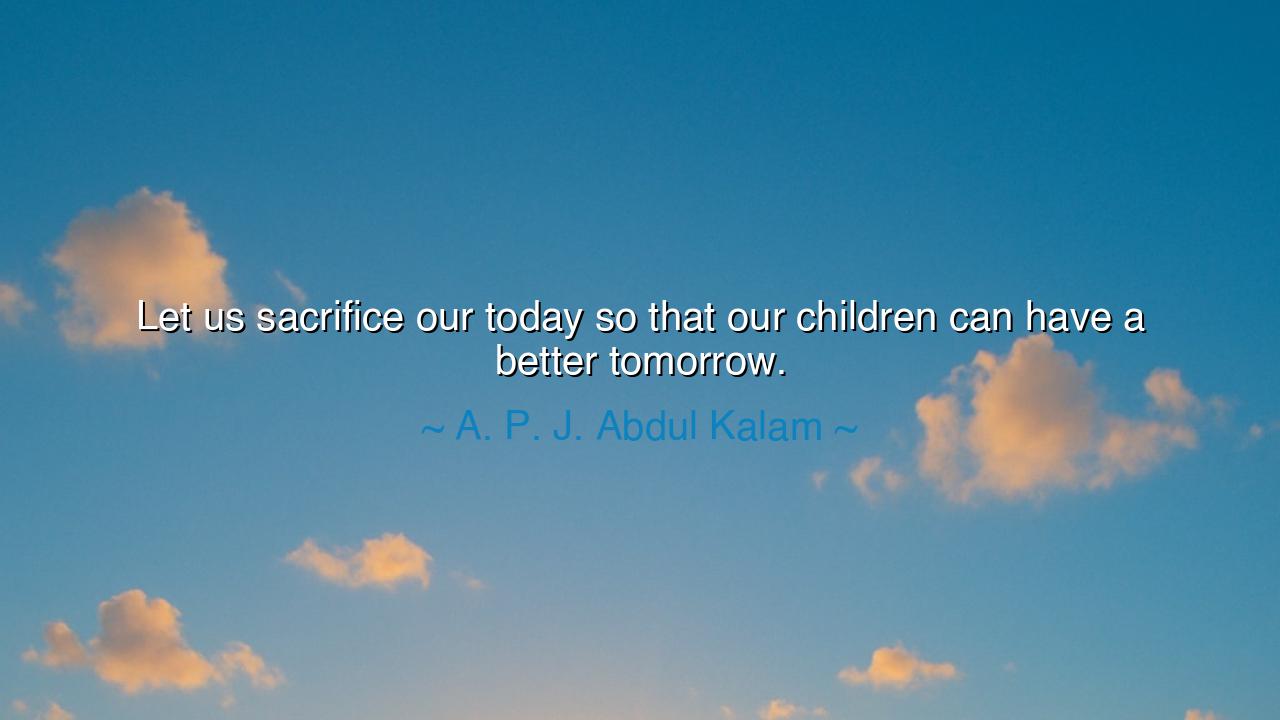
Let us sacrifice our today so that our children can have a better






In the endless cycle of life, where each generation stands upon the shoulders of the one that came before, there is a profound truth that resonates through the ages. A. P. J. Abdul Kalam, a visionary of our time, spoke with a clarity and wisdom that cuts through the fleeting distractions of today: "Let us sacrifice our today so that our children can have a better tomorrow." These words carry the weight of generations, for they remind us of the sacred duty we have to future generations—not just to care for them, but to lay a foundation upon which they can build a brighter and more prosperous world. Sacrifice, in this context, is not a loss, but a gift we give to those who will walk after us, ensuring that they inherit a world far better than the one we knew.
What, then, does it mean to sacrifice our today for the sake of tomorrow? O seekers of wisdom, it is to understand that our actions today will reverberate through the lives of those who come after us. Sacrifice is not about giving up for the sake of deprivation, but about offering something of value—whether it be our time, our resources, or our efforts—in order to create a world of greater opportunity for those who follow. The choices we make today, the way we live, the way we treat the earth, and the way we invest in future generations, are the seeds that will grow into the tomorrow that our children will inherit. In this, we find our greatest calling—not to seek immediate gratification, but to focus on the long-term well-being of the world.
Consider, O children of wisdom, the example of Mahatma Gandhi, whose life was a testament to the power of sacrifice for the greater good. Gandhi did not live for personal wealth or fame, but dedicated himself to the liberation of India from colonial rule. His sacrifice was not in vain; his suffering, his humble lifestyle, and his commitment to nonviolent resistance shaped the future of millions. Gandhi’s vision was not for himself, but for the generations that would come after him. The sacrifices he made were the seeds that allowed the fruit of freedom to grow in India’s soil. His life shows us that sacrifice is not about personal loss, but about the legacy we leave for those who will inherit the world.
In the same vein, A. P. J. Abdul Kalam himself dedicated his life to the advancement of India and the empowerment of its people. As a scientist, educator, and the President of India, his vision for the future was rooted in the belief that today’s sacrifice would secure the future of the nation. Kalam was not content with the present limitations; he dreamed of a future where his children, the children of India, would rise to greatness on the foundation of knowledge, innovation, and peace. He knew that in order for future generations to thrive, the present generation must sacrifice its comfort, must work toward building institutions, and must invest in education, science, and sustainable development. Through his example, Kalam taught us that the actions we take today must be about creating a tomorrow that is worthy of our dreams.
So, O wise ones, the lesson is clear: sacrifice is not a loss, but an act of love and foresight. It is in our willingness to give up something today for the sake of tomorrow that we shape the world for future generations. Whether it is in the way we care for the earth, in the education we provide for the young, or in the principles we uphold, each action we take is an investment in a future we may never see fully realized, but one that will be felt by those who follow. Sacrifice today for the benefit of tomorrow is the legacy of those who understood that life is not simply for self-fulfillment, but for the service of others—especially the generations to come.
Consider the impact of Martin Luther King Jr., who dedicated his life to the cause of civil rights, knowing full well that the world would not change overnight. His sacrifices—his time, his comfort, his safety—were not for him alone, but for the future he envisioned. King’s work created a foundation upon which future generations could build, a world where freedom, justice, and equality would become accessible to all. King knew that sacrifice was not only a personal commitment but a universal one, a duty to the world that transcends the individual. His legacy lives on in the hearts of those who benefit from the work he began.
And so, O children of the future, let us remember that the world we leave behind will be shaped by the sacrifices we make today. Sacrifice is not a burden but a privilege—a chance to shape the future with our choices, our actions, and our commitment to something greater than ourselves. When we sacrifice for the good of others, when we invest in the long-term well-being of our children, we are creating a world that is richer, fuller, and more beautiful than the one we inherited.
What, then, must we do, O children of wisdom? We must sacrifice our today for a better tomorrow. We must look beyond our immediate desires and comforts, and focus on the greater good. Whether it is in the way we treat the earth, the way we educate our children, or the way we invest in the future, let us always remember that our sacrifices are the seeds from which future greatness will grow. Let us dedicate ourselves to creating a world where the generations that follow can stand tall on the foundation we build today. Let us sacrifice our today, so that our children can inherit a world filled with opportunity, wisdom, and peace.






AAdministratorAdministrator
Welcome, honored guests. Please leave a comment, we will respond soon